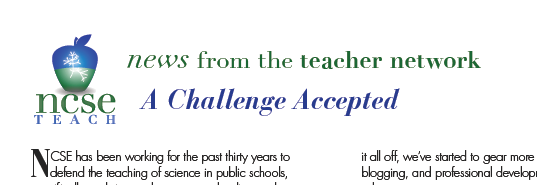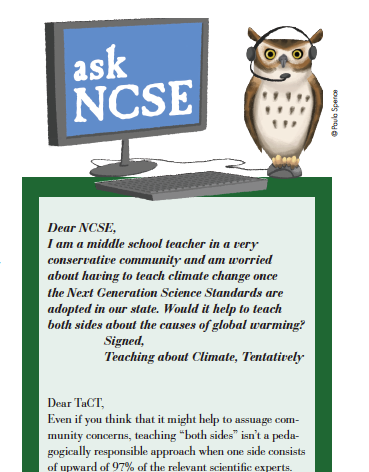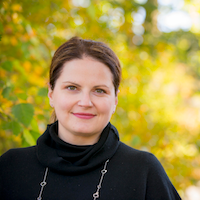If you’re a member of NCSE (and if you’re not, why not? You can join our mission here), you recently found in your mailbox the entirely redesigned Reports of the National Center for Science Education (affectionately known as RNCSE). I thought you might like to know the history of this major revamp.
 When I took over the editorial helm of RNCSE, I had basically no idea what I was getting myself into. Over the decades he was in charge, Anj Petto had successfully shepherded RNCSE through numerous changes in format. For the last several years, RNCSE had two parts—full-length features and book reviews were published online and abbreviated features and book reviews ran in a members-only newsletter that was rounded out by things like staff news, member news, and updates.
When I took over the editorial helm of RNCSE, I had basically no idea what I was getting myself into. Over the decades he was in charge, Anj Petto had successfully shepherded RNCSE through numerous changes in format. For the last several years, RNCSE had two parts—full-length features and book reviews were published online and abbreviated features and book reviews ran in a members-only newsletter that was rounded out by things like staff news, member news, and updates.
It was not the simplest system in the world. Have you ever tried to edit down a 20-page minutely detailed technical explication of the problems with creationist claims about genetics to 700 words? I have. It is painful. But this bifurcated RNCSE, despite being a little clumsy around the edges, seemed to get the job done.
So I was initially apprehensive, then full on panicked, when Ann Reid tasked me with completely revamping RNCSE from cover to cover. What she envisioned was a single publication that would serve two primary functions: 1) communicate to our membership what their support was enabling us to do, and 2) serve as a one-stop “here you go” source of information for anyone who doesn’t know who we are and what we do. On the surface, these two requirements seem at odds. But the more we thought about it, the clearer it became that the needs were entirely congruent.
 Yes, presumably our members know what we do at a high level—you know, keep bad science out of science classrooms, and good science in—but they might not, we realized, know what we did day-to-day. Unless they visit our site regularly, they wouldn’t know about our new Booster Club pilot program or the new NCSEteach network, for example. They wouldn’t know the kinds of calls we field or the legislation we track. They wouldn’t know, in short, exactly what their financial support supported!
Yes, presumably our members know what we do at a high level—you know, keep bad science out of science classrooms, and good science in—but they might not, we realized, know what we did day-to-day. Unless they visit our site regularly, they wouldn’t know about our new Booster Club pilot program or the new NCSEteach network, for example. They wouldn’t know the kinds of calls we field or the legislation we track. They wouldn’t know, in short, exactly what their financial support supported!
As for non-members, well, based on the near universal response we hear once we tell someone about NCSE—“wait, that’s still a problem?”—they needed to know not only what we do, but why we do it. Because yes, the influence of science denial on public education is still very much a problem—a huge problem. A giant-sized enormous problem.
 To serve both audiences, we produced 16-pages of content that would inform any reader of what we‘re doing and why it’s important. The “new” RNCSE, as we’ve taken to calling it, will not have much original scholarship, but we felt that was an acceptable tradeoff. There are now other outlets available for scholarship related to our work. The excellent open-access Evolution: Education & Outreach, for example, disseminates all kinds of research related to evolution. As for matters related to climate change acceptance and education, they are (wonderfully) frequent topics in science and education journals as well as the popular press. NCSE’s shift away from an academic-style publication mirrors the shift in our organization. Upon its original founding, NCSE functioned more like a think-tank than anything. But as the court battles have been won, we’ve had to refocus our efforts to be less “behind the scenes” and more on outreach and activism. So it makes sense that our primary publication change focus, too.
To serve both audiences, we produced 16-pages of content that would inform any reader of what we‘re doing and why it’s important. The “new” RNCSE, as we’ve taken to calling it, will not have much original scholarship, but we felt that was an acceptable tradeoff. There are now other outlets available for scholarship related to our work. The excellent open-access Evolution: Education & Outreach, for example, disseminates all kinds of research related to evolution. As for matters related to climate change acceptance and education, they are (wonderfully) frequent topics in science and education journals as well as the popular press. NCSE’s shift away from an academic-style publication mirrors the shift in our organization. Upon its original founding, NCSE functioned more like a think-tank than anything. But as the court battles have been won, we’ve had to refocus our efforts to be less “behind the scenes” and more on outreach and activism. So it makes sense that our primary publication change focus, too.
We are all enormously proud of “new” RNCSE. And would love your thoughts. If you are a member, and you’ve received it in the mail by now—what do you think? If you aren’t a member, we have just posted the newsletter PDF online here. Once you finish reading it, we hope you'll feel inspired to not only provide some feedback, but to become a member, too!
The next issue comes out in the spring. If there is something you want to see in the issue, let us know. A question you want to ask, ask it. An idea for a feature, propose it. We’re all ears and eager to make each issue even better than the last.
Are you a teacher and want to tell us about an amazing free resource? Do you have an idea for a Misconception Monday or other type of post? Have a fossil to share? See some good or bad examples of science communication lately? Drop me an email or shoot me a tweet @keeps3.

